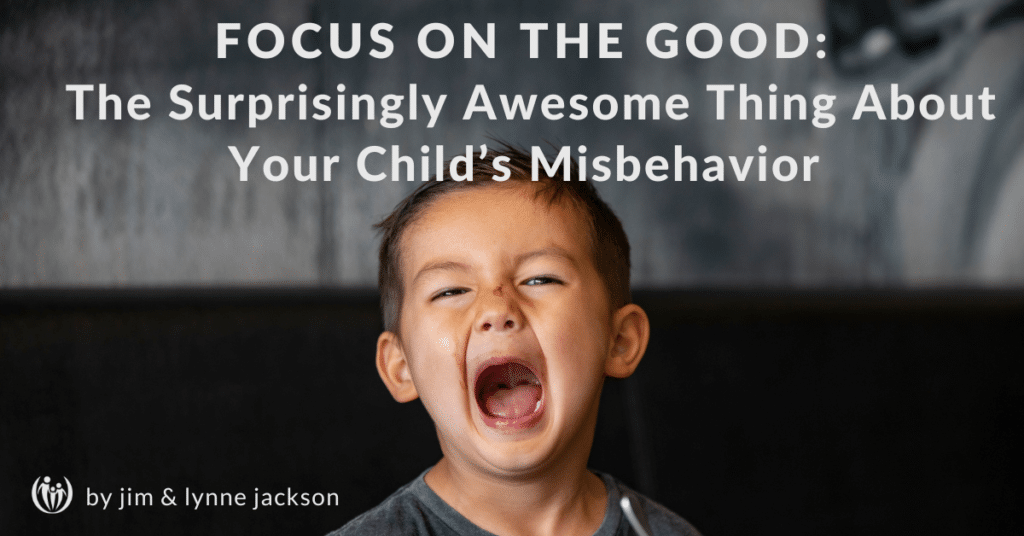
Focus on the Good: The Surprisingly Awesome Thing About Your Child’s Misbehavior

Focusing on the good is powerful.
“No one has ever said anything like that to me!” The rough-looking teen’s tough veneer had softened. I (Jim) detected tears in his eyes.
What had caused this teen, a complete stranger and one obviously out to get into trouble, to soften so surprisingly? We had a conversation, and I chose to focus on the good. The good was there, but most people didn’t see it when they interacted with this young man. Paul exhorts us to focus on whatever is good in Philippians. (Philippians 4:8) Parents often forget this when the easiest thing to focus on is the bad behavior. It takes some practice and creativity to focus on the good during misbehavior, but it’s well worth the effort.
The impact of focusing on the good
So, what was the conversation that softened a rough teen? Just minutes before, I met him in a line at our local amusement park. After a brief conversation, I dug a little deeper and asked Jared what he was good at. “Are you kidding?” He seemed angry. “Look at me.” Violent tattoos, tattered dark clothes, a defiant countenance, and multiple piercings on his ears, nose, eyebrows, and lips were suggestive of a hard life.
I asked if he was good at lying. “I’m great at it,” was his curt response, as if he wished the conversation would end.
“So you’re creative and have a good memory,” I said with a little smile.
“What do you mean?” he was quick to ask. I had his interest.
I continued my questioning. “So you’re good at that — how about skipping school?”
He smirked a little. “Yeah!”
“How do you get away with it?” I continued.
He seemed proud. “My friends and I distract the door monitor lady for each other and then take turns about who gets to leave that day.”
“So you’re a good planner, you treat your friends fairly, and you’re all willing to sacrifice for each other. Add to that list your creativity and good memory, and I’d say you’re a pretty talented guy. Imagine what might happen if you used some of those strengths in ways that were more helpful to you and others and less trouble!” My words were heartfelt, not tongue-in-cheek or manipulative.
Jared’s tone softened, “No one has ever said anything like that to me!”
Seeing people from God’s perspective
When people hear a list of misbehaviors like Jared’s, it can be easy to get distracted by trying to “straighten him out” and fix the problems. However, the starting place to capture Jared’s heart and attention was not to dwell on and try to solve his failures but to identify the gifts God gave him. Even if they were evident only in his struggles. This kind of encouragement opens even the most challenging of kids to hearing more about how God designed them.
The key to disciplining with God’s perspective is to view my children (and myself!) as God’s miraculous workmanship, even though our choices are often impacted by our sinful nature. We are created in God’s image and for His purposes. Then I can begin to see my kids as capable of great things in spite of their current misbehavior.
Even when kids like Jared get in trouble, they often use their strengths to do it. If our typical response to misbehavior is simply punishment, children often grow discouraged, believing they are trouble-makers, not gifted people.
If we truly want to help our children learn and grow into the purpose for which God created them, we need to be intentional about teaching them valuable character traits — both proactively before misbehavior and even when they’ve just misbehaved.
What’s your ultimate goal?
Many times when we work with parents, we ask them, “What’s your goal when you discipline your child?” The most common responses parents give are:
- “To make the bad behavior stop.”
- “To get our kids under control.”
- “To teach the right behavior.”
Stopping misbehavior and teaching the right behavior is not necessarily a bad goal, but it focuses only on what’s immediately wrong. If you want your kids to grow a heart that values what’s right, it’s important to notice and affirm whatever is good – even if it’s hidden behind what’s wrong.
When we look at Jesus’ ministry, we see His powerful ability to look beneath the surface of people’s problems with a vision to leverage their challenges and draw them into the kingdom. Jesus didn’t treat misbehavior/sin with an eye to just correct it but with the goal of changing hearts.
Saul the Pharisee was a prime example of this. A persecutor and murderer of Christians, Jesus met him on the road to Damascus. Instead of doling out strong punishment to Saul for his hideous acts, Jesus met him with grace, knowing that God would use Saul’s strengths to build the Kingdom. Saul’s experience was so powerful that he went away from the encounter with a new mission. He became the apostle Paul, arguably the most important missionary in all of history.
Paul learned to use his same gifts of zeal, determination, and leadership — the gifts that made him so effective at putting Christ-followers to death — to bring true Life to the world!
As parents, when you take a step back and look beneath the immediate misbehavior, it becomes easier to see the skills your child uses to misbehave. It then becomes easier to gain a vision of how God can use those gifts for His good purposes!
Start focusing on the good today:
- Consider what it means that God has created you and your child to walk in the good works already planned for you (Ephesians 2:10).
- What misbehavior does your child struggle with, and what might be a gift beneath that misbehavior? If this is difficult to answer, find more information in “Want to Know Your Child’s Strengths? Find Clues in 12 Common Misbehaviors”
- Can you think of times when God used that strength to be a blessing to others?
© 2024, 2017 Connected Families
Ready to dive in and learn more about the Framework?
Our 8-session online course, Discipline That Connects With Your Child’s Heart will guide you through each level of the Framework. If you’re looking for a grace-filled way to parent, this course is for you!




